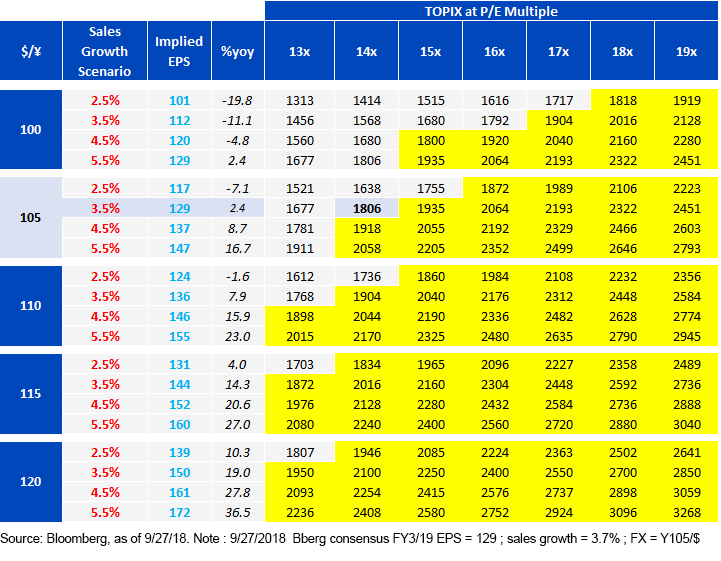Japan Focus: Positive Earnings Power


Japan is not a value trap. Against a backdrop of very attractive equity valuations—at 13.7x, the TOPIX price-to-earnings (P/E) multiple has dropped back to the lowest 5% level reported over the past decade —the trigger for upside performance must come from positive earnings surprises. Our analysis suggests the probability of a sharp positive inflection in earnings visibility is about to be delivered in Japan, possibly as early as the upcoming fiscal half-year results season, which is about to get going by the end of October (FANUC reports October 25; Toyota, November 7; Mizuho Bank, November 13).
All said, we maintain our forecast for TOPIX earnings growth of 20%, against consensus expectations of 2.5% (according to Bloomberg).
Why?
Corporate guidance and consensus estimates are based on, in our view, extremely cautious baseline assumptions. Most important, top-line sales growth is forecast to drop from 6.7% last year to a mere 3.7% in the current FY 3/2019. Now, we know that sales growth has a high correlation with nominal gross domestic product (GDP) growth; and here in Japan as well as in Japan’s major export markets—America, China and Asia—nominal GDP growth is actually accelerating. Given the high operational gearing of Japanese companies, the sensitivity of earnings to sales growth is very high. Basically, a 1% difference in baseline sales adds (or subtracts) as much as 10% to the bottom line of listed companies in Japan.
The exchange rate assumptions are the second factor making positive earnings surprises likely. Corporate guidance and consensus estimates are still based on an average of ¥105 to the U.S. dollar for the fiscal year ending March 31, 2019. Now, the fiscal-year-to-date has averaged ¥110.6 to the dollar (April 1 to September 27). That difference alone should add approximately 5% to earnings.
To be sure, Japanese corporate managers may have been wise to operate on very cautious baseline assumptions this year. At the start of the year, the threat of tariffs and other geopolitical risks were very high indeed. Personally, I doubt that managers will go all-out bullish and abandon their instinctive conservatism quite yet. However, the reality of better-than-expected top-line sales growth and a more favorable exchange rate are likely to compound into fact-driven positive earnings revisions momentum. Against the backdrop of attractive valuations, this should very much help create more positive equity market momentum in the coming months.
The following matrix looks to combine various sales growth and foreign exchange (FX) assumptions into a “fair value” grid for the Japanese market, TOPIX. For example, the current consensus assumes an FX rate of ¥105 to the dollar and 3.5% sales growth. This gives an implied EPS of 129, up 2.4%. On a 14x multiple, TOPIX fair value is 1,806; a peak-cycle P/E of 19x would suggest 2,451 as fair value on these sales and FX assumptions.
Our own target is based on sales growth of 4.5% and an FX assumption of ¥115 to the dollar, which yields a fair-value TOPIX target of 2,128—i.e., 17% upside from today’s level. And that’s on a 14x P/E multiple. In my personal view, that’s conservative given that, yes, the risks of a trade war against Japan and a nuclear war with North Korea has de- facto been mitigated.
All said, watch for a positive inflection of corporate earnings revision momentum in Japan in coming months.
Forecast for FY 3/2019

Unless otherwise noted, data source is Bloomberg as of September 27, 2018.


